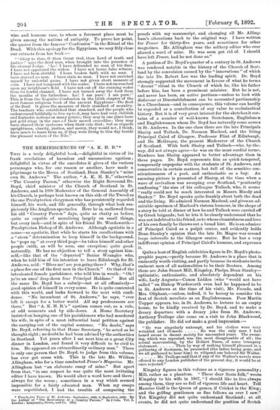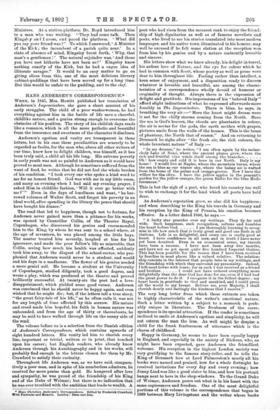THE REMINISCENCES OF "A. K. H. B."*
THIS is a truly delightful book,—delightful in virtue of its frank revelations of harmless and unconscious egotism ; delightful in virtue of the anecdotes it gives of the various personages who, for one reason or another, have made a pilgrimage to the Mecca of Scotland, Dean Stanley's " mine own St. Andrews." The author, " A. K. H. B.," otherwise " The Country Parson," otherwise the Right Reverend Dr. Boyd, chief minister of the Church of Scotland in St. Andrews, and in 1890 Moderator of the General Assembly of his Church, is perhaps beat known on this side of the Tweed as the one Presbyterian clergyman who has persistently regarded himself, his work, and life generally, through what look sus- piciously like Anglican spectacles. Here he is, mellowed from his old " Country Parson " days, quite as chatty as before, quite as capable of moralising largely on small things, but every inch—and in spite of his friend Dr. Wordsworth— Presbyterian Bishop of St. Andrews. Although egotistic in a sense—so egotistic, that while he starts his recollections with a" stern " determination to keep himself in the background, he "pops up " at every third page—he takes himself and other people (with, as will be seen, one exception) quite good- naturedly. He has no objection to tell a story against him- self,—like that of the " departed" Senior Wrangler who, when he told him of his intention to leave Edinburgh for St. Andrews, said : "Bless me! are you going there ? Why, that's a place for one of the first men in the Church." Or that of the intoxicated female parishioner, who told him in wrath : " Oh ! ye're an unto' drap-doun frae Principal Haldane." But all the same Dr. Boyd has a calmly—not at all offensively— good opinion of himself in every sense. He is quite contented with this world, and looks forward to the next with confi- dence. "No incumbent of St. Andrews," he says, "ever left it except for a better world. All my predecessors are there." But "A. K. H. B.'s " egotism comes out, as a rule, at odd moments and by side-doors. A Home Secretary insisted on hanging one of his parishioners who had murdered his wife, in spite of a most influential local petition against the carrying out of the capital sentence. "No doubt," says Dr. Boyd, referring to that Home Secretary, " he acted as he thought right ; no doubt he had been advised by the authorities in Scotland. Yet years after I sat next him at a great City dinner in London, and found it very difficult to be civil to him. He appeared an extraordinarily ordinary man." There is only one person that Dr. Boyd, to judge from this volume, has ever got cross with. This is the late Mr. William Allingham, who fox' a time conducted Fraser's Magazine. Mr. Allingham lost "an elaborate essay of mine." But apart from that, "in one respect he was quite the most irritating editor I have known. He would alter a word here and there ; always for the worse ; sometimes in a way which seemed impossible for a fairly educated man. When my essays were republished, I had the trouble of comparing the • Twenty-five Ye'rs of St. Andrews : September, 1888, to September, 1890. By the Author of "The B.eoreations of a Country Pareon." In 2 rots. Vol. I. London: Longmans, Green, and Co. Itt42. proofs with my manuscript, and changing all Mr. Ailing- ham's alterations back to the original way. I have written for Fraser for thirty-five years, and sometimes for other magazines. Mr. Allingham was the solitary editor who ever altered a word of mine. He was soon got rid of. I should have left Fraser, had he not done so."
A portion of Dr. Boyd's quarter of a century in St. Andrews was rendered notable in the history of the Church of Scot- land by the convulsion caused by the " innovations " of which the late Dr. Robert Lee was the leading spirit. Dr. Boyd strongly supported the movement in favour of what he terms " decent " ritual in the Church of which he, like his father before him, has been a prominent minister. But he is not, and never has been, an active partisan—unless to look with disfavour at Disestablishment can be accounted partisanship in a Churchman—and in consequence, this volume can hardly be regarded as a contribution of any value to ecclesiastical history. But it is of very great interest for the sketches it con- tains of a number of well-known Scotchmen, Englishmen and Englishwomen whom Dr. Boyd has naturally come acmes in St. Andrews. In the one class there are the late Principals Shairp and Tulloch, Dr. Norman Macleod, and the living Principal Caird of Glasgow, Professor Flint of Edinburgh, and Dr. McGregor, the present Moderator of the Church of Scotland. With both Shairp and Talloch—who, by-the- way, did not always agree—he was on the most cordial terms. Nowhere has Shairp appeared to better advantage than in these pages. Dr. Boyd represents him as quick-tempered, temporarily unpopular with the students of St. Andrews, and conservative in certain matters, but full of the sensitive con- scientiousness of a poet, and enthusiastic as a boyl An amusing picture is presented of Shairp, at the time when a wave of revivalism was sweeping over Scotland, "penitently confessing" the sins of his colleague Tulloch, who, it seems "really could not be much interested in Messrs. Moody and Sankey." Dr. Boyd speaks quite frankly about both the dead and the living. He admired Norman Macleod, and gives an ad- mirable specimen of Macleod's riotous humour, in the shape of a story he told at dinner of bow he and Tulloch were carried off by Greek brigands; but he lets it be clearly understood that he
was not indebted to his friend, as to whose clannishness and love of his own family he throws out a broad hint. He is an admirer of Principal Caird as a pulpit orator, and evidently holds Dean Stanley's opinion that the late Dr. Magee was second Longo intervallo to the Glasgow orator. But he has a very indifferent opinion of Principal Caird's humour, and expresses
it. Quite a host of English celebrities figure in Dr. Boyd's photo- graphic pages,—partly because St. Andrews is a place that is eminently worth visiting, and partly because its students invite
eminent men of all nationalities to be their Rectors. Among these are John Stuart Mill, Kingsley, Phelps, Dean Stanley—
optimistic, enthusiastic, and absolutely dependent on his wife, Lady Augusta—Canon Lidden (who "would not have called" on Bishop Wordsworth even had he happened to be in St. Andrews at the time of his visit), Mr. Froude, and Mrs. Oliphant,—unless, indeed, it be heresy to consider the first of Scotch novelists as an Englishwoman. Poor Martin Tupper appears, too, in St. Andrews, to lecture to an empty
house, to be kindly received by Dr. Boyd, and to make a dreary departure with a dreary joke from St. Andrews. Anthony Trollope also came on a visit to John Blackwood, the publisher. He did not make a good impression :— " He was singularly unkempt, and his clothes were very wrinkled and ill-made He was the only man I had heard swear in decent society for uncounted years. The swear- ing, which was repeated, was the most disagreeable of all ; the actual asseverating, by the Holiest Name, of some trumpery statement Then by way of making himself pleasant in a gathering of Scotsmen, he proceeded (the ladies being gone, and we all gathered to hear him) to vilipend our beloved Sir Walter.
Mr. Trollope said that if any of Sir Walter's novels were offered to any London publisher of the present day, it would be at once rejected."
Kingsley figures in this volume as a vigorous personality ; Mill, rather as a phantom. " These dear Scots folk," wrote Kingsley to his wife in 1867, " I should like to live always among them, they are so full of vigorous life and heart. Tell Maurice Golf is the Queen of games, if Cricket is the King; and the golfing gentlemen as fine fellows as ever I saw." Yet Kingsley did not quite understand Scotland ; at all events, he did not quite_ understand the position of Scotch Ministers. At a station-platform Dr. Boyd introduced him to a man who was waiting. "They had some talk. Then Kingsley an i I arose, and paced the platform. What did you say your friend was To which I answered, A Minister of the Kirk ; the incumbent of a parish quite near.' In a state of absence of mind, Kingsley burst forth, Why, that man's a gentleman ! ' The natural rejoinder was, And those
you have met hitherto have not been so Kingsley knew nothing erectly of the Kirk, but he had a vague idea of illiterate savages." It would be an easy matter to go on giving slices from this, one of the most delicious literary cabinet-puddings that have been served up for a long time. But this would be unfair to the pudding, and to the dui.







































 Previous page
Previous page